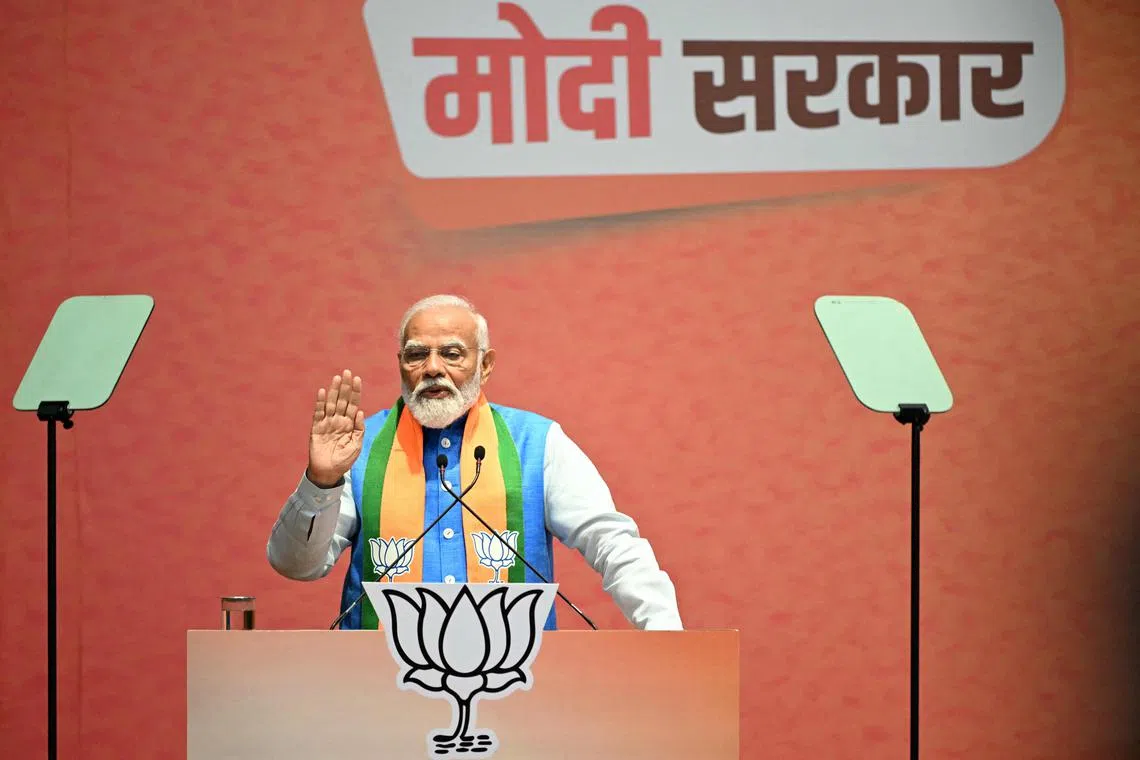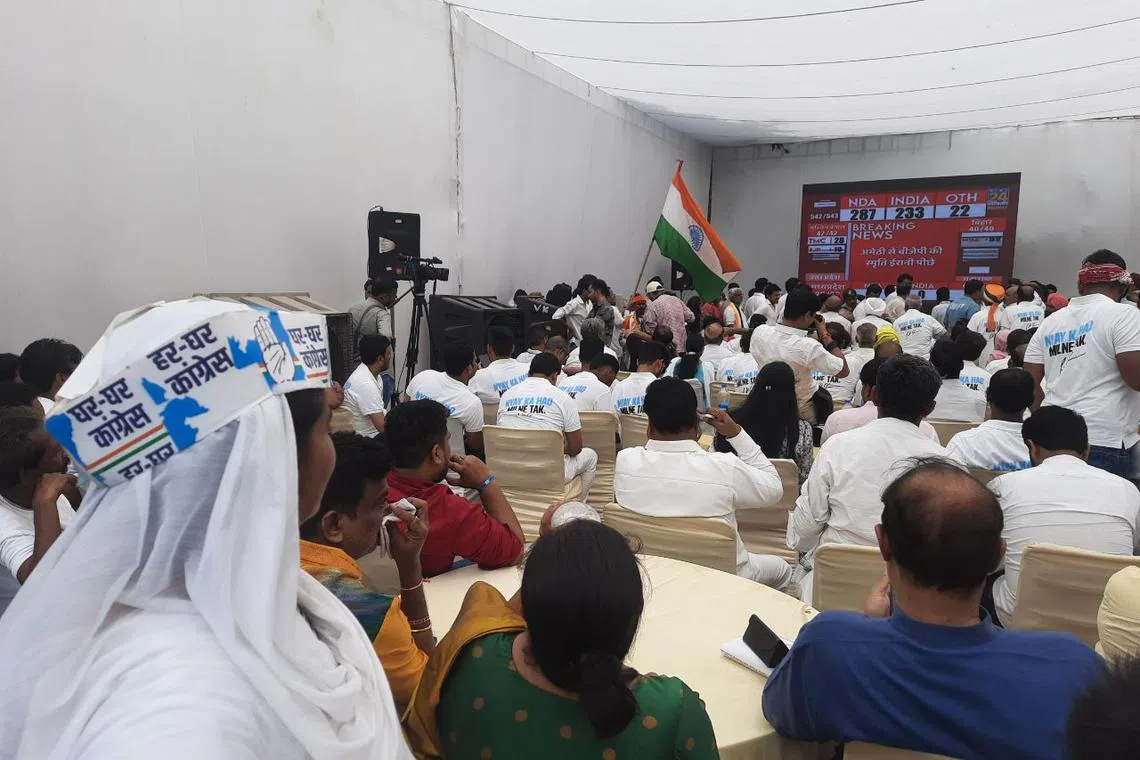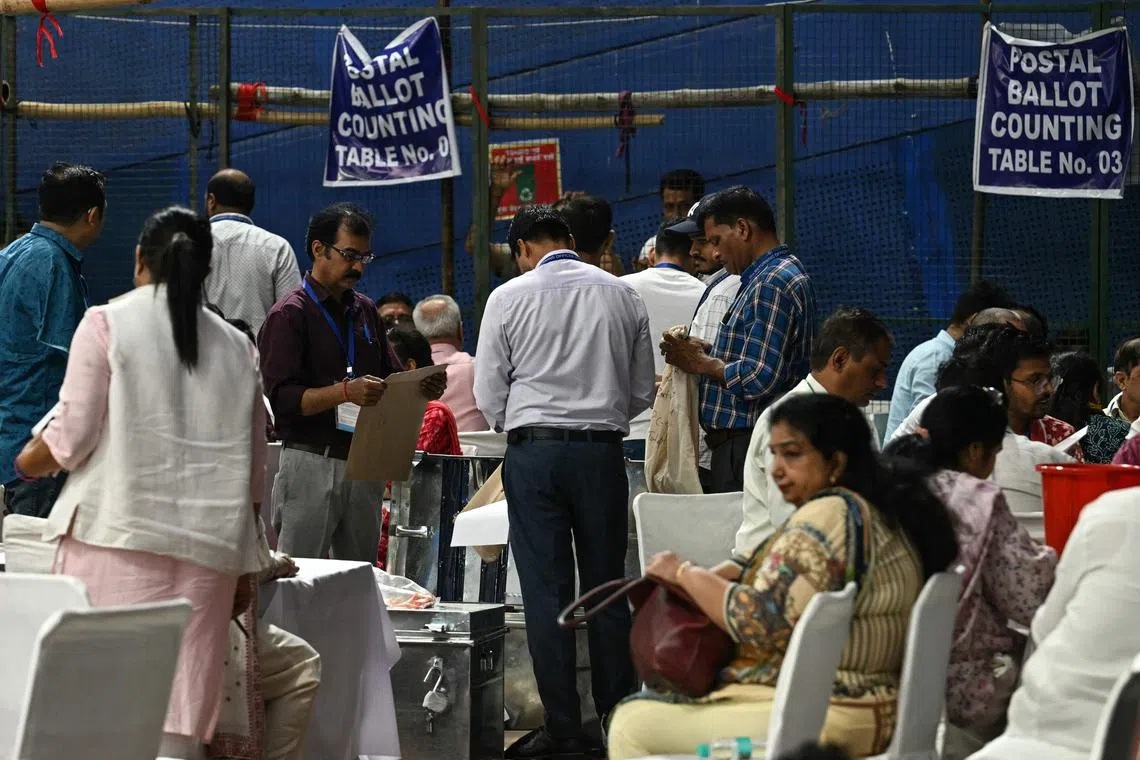India election: Modi’s BJP wins historic third term, but loses decade-old parliamentary majority
Sign up now: Get insights on Asia's fast-moving developments
BENGALURU/NEW DELHI – India’s ruling alliance led by the Bharatiya Janata Party (BJP) won a historic third consecutive term, even as the party lost its decade-old majority in an underwhelming victory for Prime Minister Narendra Modi.
He now faces the prospect of a coalition government, which could slow policymaking but also temper Hindu-first instincts that have heightened communal tensions.
The BJP won 240 seats out of 543 seats in the Lower House, according to India’s national election commission. This is short of the 272 seats needed to form the next government, and falls well behind the 303 seats it scored in 2019 and 282 in 2014.
“NDA will work tirelessly to make India the third-largest economy,” Mr Modi said as he addressed his supporters at the BJP’s headquarters in New Delhi, referring to the BJP-led National Democratic Alliance. “If the country has to develop, then we have to fight relentlessly against corruption.”
The re-election means Mr Modi is only the second Indian prime minister to win three terms after Mr Jawaharlal Nehru, though the BJP’s narrower lead than what was suggested in exit polls means the party is likely to have fallen short of its own target of 370 seats and 400 for the NDA.
In its two previous terms, the BJP’s definitive majority had enabled the party to revoke the autonomy of Kashmir, India’s only Muslim-majority state, enact a citizenship law that favoured non-Muslim refugees and pass a slew of laws to curb speech, online and offline.
The BJP’s tighter-than-expected lead, though, spooked India’s financial markets on June 4, sparking a sell-off in the stock market. The benchmark NSE Nifty 50 Index suffered its worst loss in more than four years, ending down nearly 6 per cent, while the rupee fell the most in a year.

The National Democratic Alliance, led by Mr Narendra Modi’s Bharatiya Janata Party, raced to an early lead in vote counting on June 4.
PHOTO: AFP
This is also the first time the BJP under Mr Modi did not single-handedly win a simple majority of 272 seats.
It will now have to rely on key regional allies like the Telugu Desam Party in southern Andhra Pradesh and Janata Dal (United) in Bihar. The BJP reportedly began negotiations with them even before the final votes were tallied.
A coalition government could mean that the BJP will find it harder to muscle controversial laws through Parliament, and may have to shelve longstanding promises of a uniform civil code and simultaneous state and central elections.
The BJP’s commitment to infrastructure development and attracting foreign investment are, however, unlikely to be stymied by its potential allies, who may extract only Cabinet berths or policies for their region in exchange for cooperation.
More than 642 million people – the largest number in the world – voted over seven rounds of polling held between April 19 and June 1 for 543 parliamentary constituencies across 28 states and eight union territories. This was 66.5 per cent of the total registered voters.

Staff hold sealed electronic voting machines inside a vote counting centre in Mumbai on June 4.
PHOTO: REUTERS
“Balance has been restored. Today, Modi is just another politician, cut to size by the people,” said political analyst Pratap Bhanu Mehta, a former vice-chancellor of Ashoka University. He expressed relief that the electorate had voted in a strong opposition that eliminated the “suffocating” idea that there was no political alternative to the BJP.
In a sign of the BJP’s utter dominance over Indian politics in the past decade, its surprisingly smaller winning margin cast what seemed almost like a shadow of defeat on the party’s supporters.
The BJP’s sprawling headquarters in New Delhi wore a relatively quiet look all through the afternoon of June 4 as supporters waited glued to television screens flashing updates on the latest results.

Supporters at the Congress party’s HQ in Delhi where large air coolers have been installed to keep supporters cool on June 4.
ST PHOTO: DEBARSHI DASGUPTA
It was only in the evening that traditional drummers hired by the party started off a rhythm that encouraged supporters to dance frenetically under an unexpected downpour.
Mr Shankar Lal Modi, 67, who held a laminated photo of Mr Modi being blessed by his late mother, had taken a bus to Delhi from Bikaner in Rajasthan to join the jubilation. Although disheartened at the result, he said: “Everything will be fine. Modi ji’s efforts will not go in vain. He has the blessing of tens of millions of mothers.”
One of the more surprising developments is the pushback in the northern state of Uttar Pradesh, where the BJP swept the vast majority of the Lok Sabha election in 2019.
In this election, BJP candidate Lallu Singh lost to an Indian National Developmental Inclusive Alliance (India) bloc candidate from the opposition in the Faizabad seat, which includes Ayodhya, where a grand Ram temple was opened to the public earlier in 2024. The temple, built on the site of a mediaeval mosque that a Hindu mob demolished in 1992 amid nationwide Hindu-Muslim riots, was a part of the BJP’s longstanding campaign to mobilise Hindu voters in the name of religion.
Faizabad is part of the massive gains the opposition made in Uttar Pradesh in this election. The Congress-led India bloc won 43 seats, with the BJP taking 33 seats, down from the over 60 seats it won in the 2019 Lok Sabha election.
The pushback against Mr Modi’s Hindu nationalism was also evident in Banswara, the constituency in the desert state of Rajasthan where he made a poll speech in April referring to Muslims as “infiltrators”. The BJP candidate lost to the regional party candidate by more than 200,000 votes.
“It is clear that the mandate has gone against Modi... it is a moral defeat for him,” said Congress president Mallikarjun Kharge at a press conference held at the party’s Delhi headquarters that were so crowded that bouncers had a difficult time keeping people out.

Election officials work at a vote counting station in New Delhi on June 4. The Election Commission of India said the counting process will be as transparent as possible.
PHOTO: AFP
“We focused our fight on the unemployed, the farmers and the poor of this country – and that’s what paid us dividends. The BJP, meanwhile, spread lies and hatred, running a vicious campaign. And people have rejected that,” Mr Kharge added.
The 2024 election is also noteworthy for the re-emergence of the beleaguered Congress party.
Mr Rahul Gandhi, scion of the Gandhi-Nehru Indian political dynasty that spawned three prime ministers, won the two seats he contested in Kerala’s Wayanad and Uttar Pradesh’s Rae Bareli constituencies. He had lost the Amethi seat in Uttar Pradesh to a BJP candidate in 2019, who has in turn lost to Mr Gandhi’s close aide this time.
Congress supporters like Mr Dinesh Sharma, 30, who wore a long tunic emblazoned with Mr Gandhi’s face, were cheering every time an India bloc candidate inched ahead of the BJP. “We have sworn that as long as Rahul Gandhi does not become the prime minister, we will keep the struggle on,” he said.
As the votes were counted, there were dramatic scenes on news channels too, with TV pundits applauding the Indian voter for “upholding the power of democracy”.
Some star candidates won, like Congress’ suave former diplomat Shashi Tharoor in Thiruvananthapuram in Kerala, defeating former union minister for IT and electronics Rajeev Chandrashekar. Actor and first-time BJP contestant Kangana Ranaut won in the Mandi seat in the hill state of Himachal Pradesh.
More than 12 hours after vote counting started, the 73-year-old Mr Modi finally addressed his supporters gathered in New Delhi in a speech that lacked his usual sparkle, but reflected his rush to get to the Prime Minister’s Office again.
“We don’t have the time to pause or stop. This is the time to move ahead in national interest,” he said.
Correction note: In an earlier version of this story, we spelled the name of an Indian city in the state of Rajasthan wrongly. It should be spelled Banswara. We are sorry for the error.


